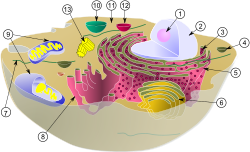Gumtoo
Baayoloojii lubbiyyoo keessatti, orgaaneeliin ykn gumtoon qaama lubbiyyoo dalagaa murtaa’e hojjetudha.

Orgaaneelonni yeroo baay’ee naannoo isaaniitti sabaga lubbiyyoo qabu. [1] Orgaaneloonni seelii irra caalaan isaanii yaatoo lubbiyyoo keessa jiru . [2]
Maqaan organelle jedhu caasaan kun seeliidhaaf qaamni tokko nafaaf maal akka ta'e yaada jedhu irraa kan dhufedha .
Orgaaneelota yuukaariyootii
gulaaliOrganeelota gurguddoo
gulaali| Gumtoo | Dalagaa ijoo | Caasaa | Micirjirtii | Yaadannoo |
|---|---|---|---|---|
| Caasmagarroo | Jaariftina | kutaa sabaga lamaa | Biqiltuufi pirootistaa | DNA muraasa qaba; jalqaba waliin leeyya keessoo irraa kan argame. |
| Xaxeeta lubbiyyoo | translation and folding of new proteins (rough endoplasmic reticulum), expression of lipids (smooth endoplasmic reticulum) | single-membrane compartment | all eukaryotes | rough endoplasmic reticulum has many ribosomes, and folds that are flat sacs; smooth endoplasmic reticulum has folds that are tubular |
| flagellum | locomotion, sensory | some eukaryotes | ||
| Golgi apparatus | sorting and modification of proteins | single-membrane compartment | all eukaryotes | |
| mitochondrion | energy production | double-membrane compartment | most eukaryotes | has some DNA; originally obtained by endosymbiosis |
| nucleus | DNA maintenance, RNA transcription | double-membrane compartment | all eukaryotes | has bulk of genome |
| vacuole | storage, homeostasis | single-membrane compartment | eukaryotes |
Orgaaneloota xixiqqoo
gulaali| Organelle/Macromolecule | Main function | Structure | Organisms |
|---|---|---|---|
| acrosome | helps spermatoza fuse with ovum | single-membrane compartment | many animals |
| autophagosome | vesicle which collects cytoplasmic material and organelles for degradation | double-membrane compartment | all eukaryotic cells |
| centriole | anchor for cytoskeleton | microtubule protein | animals |
| cilium | movement in or of external medium. | microtubule protein | animals, protists, few plants |
| cnidocyst | stinging | coiled hollow tubule | cnidarians |
| eyespot apparatus | detects light, allowing phototaxis to take place | green algae and other unicellular photosynthetic organisms such as Euglena | |
| glycosome | carries out glycolysis | single-membrane compartment | Some protozoa, such as Trypanosomes. |
| glyoxysome | conversion of fat into sugars | single-membrane compartment | plants |
| hydrogenosome | energy & hydrogen production | double-membrane compartment | a few unicellular eukaryotes |
| lysosome | breakdown of large molecules (e.g., proteins + polysaccharides) | single-membrane compartment | by convention, animal cells; but (wider definition) most eukaryotes |
| melanosome | pigment storage | single-membrane compartment | animals |
| mitosome | not known | double-membrane compartment | a few unicellular eukaryotes |
| myofibril | muscular contraction | bundled filaments | animals |
| nucleolus | ribosome production | protein-DNA-RNA | most eukaryotes |
| parenthesome | not known | not known | fungi |
| peroxisome | breakdown of metabolic hydrogen peroxide | single-membrane compartment | all eukaryotes |
| proteasome | degradation of unneeded or damaged proteins by proteolysis | very large protein complex | All eukaryotes, all archaea, some bacteria |
| ribosome | translation of RNA into proteins | RNA-protein | eukaryotes, prokaryotes |
| stress granule | mRNA storage | membraneless (mRNP complexes) | Most eukaryotes |
| vesicle | material transport | single-membrane compartment | all eukaryotes |